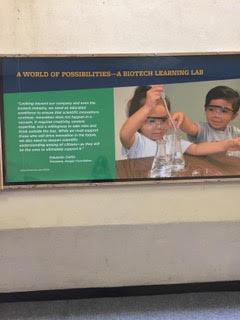Which Dots Get Connected in Biotech Education?

Berkeley’s Lawrence Hall of Science, whose mission is “to inspire and foster science learning for all,” is currently planning a new exhibit, a “biotech learning lab.” Arresting promotional panels featuring intent preschoolers manipulating beakers include a quote from the president of biotech heavy-hitter Amgen, one of the Hall’s major corporate donors. It connects the dots between a “Biotech Learning Lab” and “A World of Possibilities”:
While we must support those who will drive innovation in the future, we also need to deepen scientific understanding among all citizens – as they will be the ones to ultimately support it.”
Children will learn to drive and support the biotech world of possibilities. And like all the Hall’s interactive exhibits, this learning lab should be an opportunity to make science fun and engaging.
Biotechnology, of course, is more than just a field of scientific study. It is a technological platform seamlessly merging basic and applied science, a blended arena where the desire for commercialized corporate bio-products and patent opportunities often dictate research agendas. So the Hall’s planned exhibit raises questions not just about science but about social science, culture, and ethics, too. For example what, besides science, will children learn about biotech? What is “the biotech world of possibilities”?
“[C]loning, gene editing, DNA sequencing and more have revealed a world of possibilities,” a second panel boasts, with scarcely a hint at the social and moral tumult riding in tandem with these biotechnologies. More than 40 countries around the globe have prohibitions against human germline (i.e. heritable) modification. Even so, earlier this year the National Academies of Science and the National Academy of Medicine issued a report concluding that, “clinical trials using heritable germline genome editing should be permitted”. New York Times coverage characterized gravely the importance of the report. It lends “its support to a once-unthinkable proposition: the modification of human embryos to create genetic traits that can be passed down to future generations.
Subsequently, Center for Genetics and Society Executive Director Marcy Darnovsky connected the dots biotech educators seem ready to ignore: The report acknowledges, she says, “many of the widely recognized risks, including stigmatizing people with disabilities, exacerbating existing inequalities, and introducing new eugenic abuses. [But] Strangely, there’s no apparent connection between those dire risks and the recommendation to move ahead.”
What better way to facilitate a future where citizens are rendered unable to detect connections between dire risks and bullish recommendations than to finance a Hall of Science that functions as a Corridor to Controversy Nullification?



